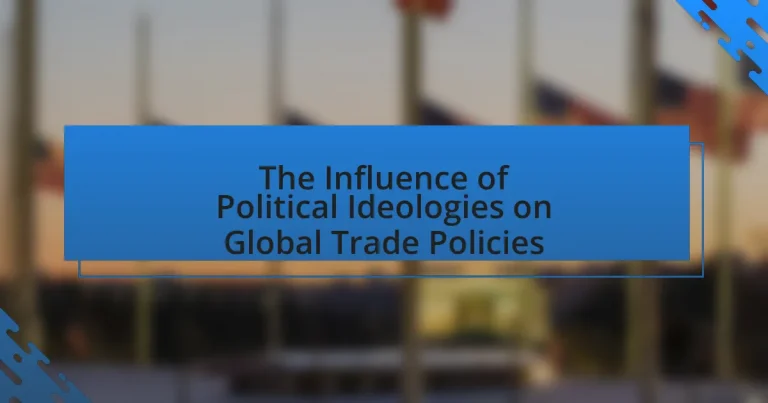The article examines the influence of political ideologies on global trade policies, highlighting how ideologies such as neoliberalism, protectionism, and socialism shape government priorities and regulatory frameworks. It discusses the impact of these ideologies on trade agreements, international relations, and economic globalization, providing historical examples like NAFTA and the U.S.-China trade war. The article also explores current trends, including the rise of nationalism and environmental considerations, and their implications for future trade policies and negotiations. Understanding these ideological influences is crucial for navigating the complexities of global trade dynamics.

What is the Influence of Political Ideologies on Global Trade Policies?
Political ideologies significantly shape global trade policies by influencing government priorities, regulatory frameworks, and international relations. For instance, neoliberal ideologies advocate for free trade and minimal government intervention, leading to policies that promote open markets and reduce tariffs, as seen in agreements like NAFTA. Conversely, protectionist ideologies prioritize domestic industries and jobs, resulting in tariffs and trade barriers, exemplified by the U.S.-China trade war initiated under a more nationalist approach. Historical evidence shows that countries with leftist ideologies often pursue trade policies that emphasize social welfare and equitable distribution, while right-leaning governments may focus on economic growth and competitiveness. Thus, the alignment of political ideologies with trade policies directly impacts global economic interactions and trade dynamics.
How do political ideologies shape trade policy decisions?
Political ideologies significantly shape trade policy decisions by influencing the priorities and approaches of governments regarding international trade. For instance, liberal ideologies typically advocate for free trade, emphasizing minimal government intervention and the benefits of open markets, which can lead to policies that reduce tariffs and promote trade agreements. In contrast, protectionist ideologies prioritize domestic industries and jobs, often resulting in higher tariffs and trade barriers to shield local economies from foreign competition. Historical examples include the United States’ shift towards protectionism under the Trump administration, which implemented tariffs on steel and aluminum imports, reflecting a nationalist ideology aimed at protecting American manufacturing. Conversely, the European Union’s trade policies often reflect a liberal ideology, promoting free trade agreements with various countries to enhance economic integration and growth.
What are the key political ideologies influencing trade policies?
Key political ideologies influencing trade policies include liberalism, protectionism, and mercantilism. Liberalism advocates for free trade and minimal government intervention, promoting economic efficiency and consumer choice, as seen in agreements like NAFTA. Protectionism emphasizes safeguarding domestic industries through tariffs and quotas, often justified by the need to protect jobs and national security, exemplified by the U.S. tariffs on steel and aluminum. Mercantilism focuses on maximizing national wealth through a positive trade balance, encouraging exports over imports, which can be observed in historical practices of colonial powers. Each ideology shapes trade policies by influencing government decisions on tariffs, trade agreements, and international relations.
How do these ideologies manifest in specific trade agreements?
Political ideologies manifest in specific trade agreements through the principles and priorities that shape the terms and conditions of those agreements. For example, neoliberal ideologies emphasize free trade and minimal government intervention, which is evident in agreements like the North American Free Trade Agreement (NAFTA), where tariffs were significantly reduced to promote trade among the U.S., Canada, and Mexico. Conversely, protectionist ideologies focus on safeguarding domestic industries, as seen in the U.S.-China trade agreement, which included tariffs and quotas to protect American manufacturing. These ideological influences directly affect the negotiation processes, the inclusion of labor and environmental standards, and the overall economic strategies of the countries involved.
Why is understanding political ideologies important for global trade?
Understanding political ideologies is crucial for global trade because they shape the policies and regulations that govern international commerce. Political ideologies influence government priorities, trade agreements, and economic strategies, which directly affect market access and trade relations. For instance, countries with free-market ideologies tend to promote open trade policies, while those with protectionist ideologies may impose tariffs and quotas, impacting global supply chains. Historical examples include the trade policies of the United States under different administrations, where shifts in ideology led to significant changes in trade agreements like NAFTA and the US-China trade relations. Thus, comprehending these ideologies allows businesses and policymakers to navigate the complexities of global trade effectively.
How do political ideologies affect international relations and trade?
Political ideologies significantly shape international relations and trade by influencing a country’s foreign policy, economic strategies, and diplomatic interactions. For instance, capitalist ideologies often promote free trade agreements and open markets, as seen in the North American Free Trade Agreement (NAFTA), which aimed to reduce trade barriers among the U.S., Canada, and Mexico. Conversely, socialist ideologies may prioritize state control over resources and protectionist measures, leading to tariffs and trade restrictions, as evidenced by Venezuela’s economic policies under socialist leadership. Additionally, ideological alignments can affect alliances and partnerships; countries with similar political beliefs, such as democratic nations, tend to collaborate more closely in trade and diplomatic efforts, while ideological differences can lead to tensions, as seen in U.S.-China relations, where differing political systems have resulted in trade disputes and tariffs.
What role do political ideologies play in economic globalization?
Political ideologies significantly shape economic globalization by influencing trade policies, regulatory frameworks, and international cooperation. For instance, neoliberalism promotes free markets and minimal government intervention, leading to policies that favor deregulation and trade liberalization, which have been pivotal in expanding global trade networks since the late 20th century. In contrast, protectionist ideologies advocate for tariffs and trade barriers to safeguard domestic industries, as seen in the recent rise of nationalist movements in various countries, which have challenged existing trade agreements and led to increased economic isolationism. Historical examples include the impact of the Washington Consensus in the 1990s, which encouraged globalization through market-oriented reforms, while more recent trends reflect a backlash against these ideologies, highlighting the dynamic interplay between political beliefs and economic practices in the global arena.

How do different political ideologies impact trade policy outcomes?
Different political ideologies significantly impact trade policy outcomes by shaping the priorities and approaches of governments toward international trade. For instance, liberal ideologies typically advocate for free trade, emphasizing minimal government intervention and the benefits of open markets, which can lead to trade agreements that reduce tariffs and promote globalization. In contrast, protectionist ideologies prioritize domestic industries and jobs, often resulting in policies that impose tariffs and trade barriers to shield local economies from foreign competition. Historical examples include the United States’ shift toward protectionism under the Trump administration, which enacted tariffs on steel and aluminum imports, contrasting with previous administrations that favored free trade agreements like NAFTA. Thus, the ideological stance of a government directly influences its trade policies, affecting global trade dynamics and economic relationships.
What are the effects of liberalism on global trade policies?
Liberalism significantly influences global trade policies by promoting free trade, reducing tariffs, and encouraging open markets. This ideology advocates for minimal government intervention in economic activities, leading to increased international trade and investment. For instance, the establishment of trade agreements such as the North American Free Trade Agreement (NAFTA) in 1994 exemplifies how liberalism has facilitated cross-border trade by eliminating tariffs on goods between the U.S., Canada, and Mexico. Additionally, the World Trade Organization (WTO), founded in 1995, embodies liberal principles by aiming to create a global trading system that reduces trade barriers and fosters economic cooperation among member countries. These frameworks demonstrate that liberalism has led to a more interconnected global economy, enhancing trade flows and economic growth.
How does liberalism promote free trade agreements?
Liberalism promotes free trade agreements by advocating for open markets and the reduction of trade barriers. This ideology emphasizes the benefits of economic interdependence, arguing that free trade enhances efficiency, fosters competition, and leads to greater consumer choice. Historical evidence, such as the establishment of the General Agreement on Tariffs and Trade (GATT) in 1947, illustrates how liberal principles have shaped international trade frameworks, facilitating negotiations that lower tariffs and promote trade liberalization among member countries.
What challenges does liberalism face in trade negotiations?
Liberalism faces several challenges in trade negotiations, primarily due to conflicting national interests and protectionist sentiments. These challenges arise as countries prioritize domestic industries and jobs over liberal trade principles, leading to resistance against free trade agreements. For instance, the rise of populist movements in various countries has resulted in increased tariffs and trade barriers, undermining the liberal agenda of reducing trade restrictions. Additionally, the complexity of global supply chains complicates negotiations, as nations must balance their commitments to liberal trade with the need to protect local economies. This tension is evident in recent trade disputes, such as the U.S.-China trade war, where liberal ideals were challenged by national security concerns and economic nationalism.
How does protectionism influence global trade policies?
Protectionism significantly influences global trade policies by promoting barriers to imports, such as tariffs and quotas, which aim to protect domestic industries from foreign competition. This approach can lead to retaliatory measures from other countries, resulting in trade wars that disrupt international trade flows. For instance, the U.S.-China trade war initiated in 2018 involved increased tariffs on hundreds of billions of dollars’ worth of goods, illustrating how protectionist policies can escalate tensions and alter trade dynamics globally. Additionally, protectionism can shift the focus of trade agreements, as countries may prioritize bilateral agreements over multilateral ones to safeguard their interests, further complicating the global trade landscape.
What are the main arguments for protectionist trade policies?
The main arguments for protectionist trade policies include the protection of domestic industries, preservation of jobs, and national security. Protectionist measures, such as tariffs and quotas, aim to shield local businesses from foreign competition, thereby fostering economic growth within the country. For instance, the U.S. steel tariffs implemented in 2018 were justified by the argument that they would protect American steel manufacturers from cheaper imports, which could lead to job losses in the domestic sector. Additionally, proponents argue that protecting key industries is vital for national security, ensuring that a country can maintain self-sufficiency in critical sectors. Historical examples, such as the Smoot-Hawley Tariff Act of 1930, illustrate how protectionist policies were employed during economic downturns to safeguard local economies.
How do protectionist policies affect international trade relations?
Protectionist policies negatively impact international trade relations by creating barriers to trade, such as tariffs and quotas, which lead to increased costs for importing goods. These measures can provoke retaliatory actions from other countries, resulting in trade wars that disrupt global supply chains. For instance, the U.S.-China trade war initiated in 2018 saw both nations imposing tariffs on billions of dollars’ worth of goods, which not only strained bilateral relations but also affected global markets and economies. Such protectionist measures can diminish cooperation among nations and hinder economic growth by limiting market access and reducing competition.
What is the impact of socialism on trade policies?
Socialism significantly impacts trade policies by promoting state control over key industries and prioritizing domestic production over international trade. This approach often leads to protectionist measures, such as tariffs and quotas, aimed at shielding local businesses from foreign competition. For instance, countries like Cuba and Venezuela have implemented strict trade regulations to maintain economic sovereignty and reduce dependency on global markets. Additionally, socialist policies may encourage trade agreements that favor equitable distribution of resources rather than profit maximization, as seen in some Latin American nations that have pursued regional integration based on solidarity rather than competition.
How do socialist ideologies approach trade and economic cooperation?
Socialist ideologies approach trade and economic cooperation by emphasizing collective ownership and equitable distribution of resources. These ideologies advocate for trade policies that prioritize social welfare over profit maximization, often supporting protectionist measures to shield domestic industries and workers from global competition. Historical examples include the trade practices of the Soviet Union, which focused on state-controlled trade agreements that aligned with socialist principles, aiming to promote mutual benefit among socialist states rather than capitalist exploitation. Additionally, contemporary socialist movements often call for fair trade initiatives that ensure labor rights and environmental sustainability, reflecting a commitment to ethical economic practices.
What are the implications of socialist trade policies for global markets?
Socialist trade policies can lead to increased state intervention in global markets, resulting in protectionist measures that may disrupt free trade. These policies often prioritize domestic industries over international competition, which can lead to trade imbalances and retaliatory tariffs from other nations. For example, countries like Venezuela and Cuba have implemented socialist trade policies that restrict imports and promote local production, causing significant economic isolation and reduced foreign investment. This isolation can hinder global supply chains and reduce overall market efficiency, as seen in the economic downturns experienced by these nations.

What are the current trends in political ideologies and their influence on trade policies?
Current trends in political ideologies show a significant shift towards nationalism and protectionism, which directly influence trade policies by prioritizing domestic industries over international trade agreements. For instance, countries like the United States and the United Kingdom have adopted policies that emphasize tariffs and trade barriers, reflecting a growing skepticism towards globalization. This trend is evidenced by the U.S.-China trade war, where tariffs were imposed to protect American manufacturing, and the UK’s departure from the EU, which aimed to regain control over trade regulations. Additionally, leftist ideologies in some regions advocate for fair trade practices that prioritize labor rights and environmental standards, impacting trade negotiations and agreements. These ideological shifts are reshaping global trade dynamics, as nations increasingly align their trade policies with their political ideologies.
How are emerging political ideologies reshaping trade policies?
Emerging political ideologies are reshaping trade policies by prioritizing protectionism, sustainability, and social equity over traditional free trade principles. For instance, the rise of populist movements in various countries has led to a shift towards protectionist measures, as seen in the United States under the Trump administration, which implemented tariffs on steel and aluminum to protect domestic industries. Additionally, leftist ideologies are advocating for trade agreements that include environmental and labor standards, reflecting a growing emphasis on sustainability and social justice in trade negotiations. This shift is evidenced by the European Union’s Green Deal, which aims to align trade policies with climate goals, demonstrating how political ideologies are influencing the framework and objectives of international trade.
What role do populism and nationalism play in current trade debates?
Populism and nationalism significantly influence current trade debates by prioritizing domestic interests over global cooperation. Populist leaders often advocate for protectionist policies, arguing that free trade agreements harm local industries and jobs, which resonates with their voter base. Nationalist sentiments further amplify this perspective, as they emphasize national sovereignty and economic independence, leading to calls for tariffs and trade barriers. For instance, the rise of populist movements in countries like the United States and the United Kingdom has resulted in renegotiations of trade agreements, such as the US-Mexico-Canada Agreement (USMCA), which replaced NAFTA to better reflect national interests. This shift illustrates how populism and nationalism reshape trade policies to align with the demands of their constituents, often at the expense of international trade relations.
How do environmental ideologies influence trade agreements?
Environmental ideologies significantly influence trade agreements by prioritizing sustainability and ecological protection in policy negotiations. These ideologies often lead to the inclusion of environmental standards and regulations within trade agreements, aiming to mitigate negative impacts on the environment. For instance, the North American Free Trade Agreement (NAFTA) included side agreements focused on environmental protection, reflecting the influence of environmental advocacy groups and public opinion on trade policy. Additionally, countries with strong environmental ideologies may impose stricter regulations on imports, promoting green technologies and sustainable practices, which can reshape global trade dynamics.
What are the implications of political ideology shifts for future trade policies?
Political ideology shifts significantly impact future trade policies by altering the priorities and strategies of governments regarding international trade. For instance, a shift from a liberal to a protectionist ideology may lead to increased tariffs and trade barriers, as seen in the United States during the Trump administration, which imposed tariffs on steel and aluminum imports to protect domestic industries. Conversely, a move towards more liberal ideologies can result in trade agreements that promote free trade, such as the Comprehensive and Progressive Agreement for Trans-Pacific Partnership (CPTPP), which aims to reduce trade barriers among member countries. These ideological changes can also influence global supply chains, investment flows, and international relations, as countries reassess their trade partnerships based on their political alignments.
How might changes in political leadership affect trade negotiations?
Changes in political leadership can significantly alter trade negotiations by shifting priorities and strategies. For instance, a new leader may adopt a protectionist stance, as seen when the United States under President Donald Trump imposed tariffs on steel and aluminum in 2018, which disrupted existing trade agreements and prompted retaliatory measures from other countries. Conversely, a leadership change toward more liberal economic policies can lead to the pursuit of free trade agreements, as demonstrated by the European Union’s efforts to negotiate trade deals under different leaderships. These shifts can impact tariffs, regulations, and the overall willingness to engage in multilateral negotiations, thereby reshaping the global trade landscape.
What strategies can countries adopt to navigate ideological shifts in trade?
Countries can adopt flexible trade agreements and diversify their trade partnerships to navigate ideological shifts in trade. By establishing adaptable trade policies, nations can respond to changing political landscapes and align with countries that share similar ideologies or economic goals. For instance, countries like Canada and Mexico have renegotiated trade agreements to accommodate shifts in U.S. trade policy, demonstrating the importance of flexibility. Additionally, diversifying trade partnerships reduces dependency on any single country, allowing nations to mitigate risks associated with ideological changes. This strategy is supported by the fact that countries with a broader range of trade relationships are often more resilient to political fluctuations, as evidenced by the varied trade networks of the European Union member states.
What best practices can countries follow to align trade policies with political ideologies?
Countries can align trade policies with political ideologies by ensuring coherence between their economic strategies and ideological principles. This involves integrating social justice considerations into trade agreements, as seen in the European Union’s trade policies that emphasize labor rights and environmental standards. Additionally, countries should engage in stakeholder consultations to reflect diverse societal values, which is evident in New Zealand’s approach to trade negotiations that includes input from indigenous communities. Furthermore, implementing transparent trade practices that promote accountability can reinforce ideological commitments, as demonstrated by Canada’s commitment to fair trade principles. These practices collectively enhance the alignment of trade policies with the underlying political ideologies, fostering a more cohesive and principled approach to international trade.





